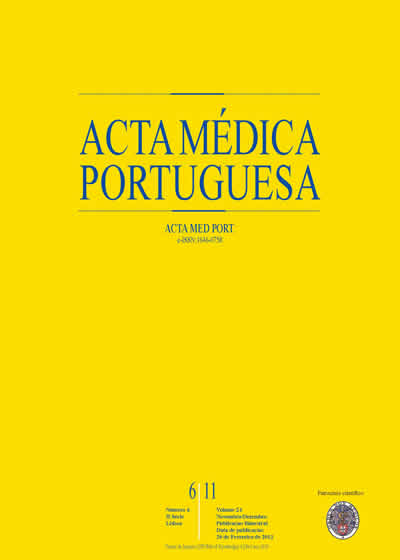Perspectivas futuras no tratamento da psoríase: novidades em terapêutica biológica.
DOI:
https://doi.org/10.20344/amp.1416Resumo
Psoriasis is an immune-mediated chronic, inflammatory disease. Due to the chronic nature of the disease, patients suffer from substantial psychological and financial burdens, thus adding to a significantly impaired quality of life. Current understanding of the pathophysiology of this condition has produced very encouraging new medical developments. The biologic therapies target precise elements of the immune cascade and their introduction to clinical practice was a significant advance in the management of refractory moderate-to-severe psoriasis. Biological therapies for the treatment of psoriasis and/or psoriatic arthritis are defined by their mode of action and are classified into the following categories: T-cell modulating agents, inhibitors of tumor necrosis factor-alpha (TNFα blockers) and inhibitors of interleukin (IL) 12 and IL-23. This article reviews the recent progress in the understanding of the molecular and immunologic basis of psoriasis and how this contributed to the introduction of new targeted therapies. It is provided an overview of the TNFα inhibitors golimumab and certolizumab, and also other agents such as ustekinumab, briacinumab, tasocitinib, sipilizumab and abatacept.Downloads
Downloads
Publicado
Como Citar
Edição
Secção
Licença
Todos os artigos publicados na AMP são de acesso aberto e cumprem os requisitos das agências de financiamento ou instituições académicas. Relativamente à utilização por terceiros a AMP rege-se pelos termos da licença Creative Commons ‘Atribuição – Uso Não-Comercial – (CC-BY-NC)’.
É da responsabilidade do autor obter permissão para reproduzir figuras, tabelas, etc., de outras publicações. Após a aceitação de um artigo, os autores serão convidados a preencher uma “Declaração de Responsabilidade Autoral e Partilha de Direitos de Autor “(http://www.actamedicaportuguesa.com/info/AMP-NormasPublicacao.pdf) e a “Declaração de Potenciais Conflitos de Interesse” (http://www.icmje.org/conflicts-of-interest) do ICMJE. Será enviado um e-mail ao autor correspondente, confirmando a receção do manuscrito.
Após a publicação, os autores ficam autorizados a disponibilizar os seus artigos em repositórios das suas instituições de origem, desde que mencionem sempre onde foram publicados e de acordo com a licença Creative Commons









